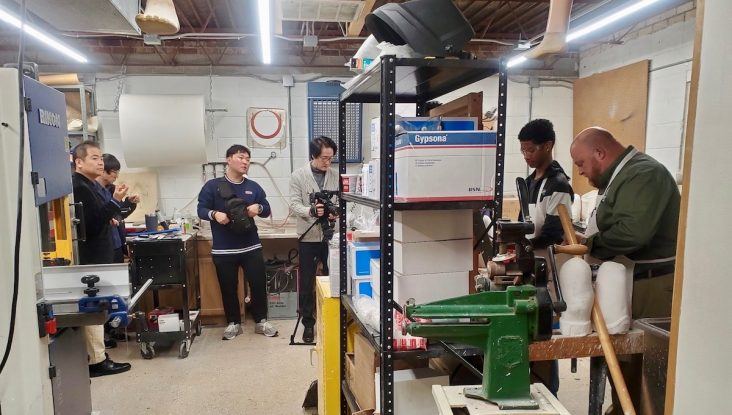South Korean film crew including Future School of Fort Smith students in documentary
by November 21, 2019 5:51 pm 1,135 views

EBS crew films footage of 10th grader Jalin Acevedo at his internship site, Snell Prosthetics & Orthotics. (photo courtesy Future School of Fort Smith)
A documentary team from Korean national public television is in Fort Smith this week taking an in-depth look at internships and secondary education.
Felix Kwon, an international reporter with EBS, South Korea’s only public television network for education, and three more members of a filming crew arrived in Fort Smith Tuesday in order to capture the Future School of Fort Smith’s method of education.
Founded in 2016, Future School of Fort Smith is a tuition-free, public charter high school centered on a personalized approach to learning via student-designed internships, personalized learning plans, and an advisor for each student. It serves students in grades 10-12. The school began with 45 students. There were 221 students enrolled Thursday (Nov. 21). Each student is required to participate in an internship each year as part of their schooling, although students who take part in Western Arkansas Technical Center opportunities at the University of Arkansas at Fort Smith can count that as an internship, said Superintendent Boyd Logan.
“We were contacted (in October) because they are shooting a documentary on education, specifically types and models of education,” Logan said. “They are looking for new models to differentiate and drive today’s learners. They have been tasked by the minister of education to create this television documentary to show in Korea of different possible education models, to educate the public as well as get feedback.”
South Korea has had a traditional education model for years, based on standardized testing and college admissions, he said. The documentary team reached out to Big Picture Learning, the network with which Future School is affiliated and is the basis for its education model. After looking at different Big Picture schools, the team chose to highlight the Future School, Logan said.
“They are looking at calling their film ‘Future School’ right now, so I think it resonated with them,” Logan said.
The film looked at the school’s website and thought it suited their needs and captured one of the models they were trying to capture, he added.
“They are real interested in our internship-based model and also that all kids have internships because though they do have some internships in Korea, it’s very much only if you are going into a vocation, like an apprenticeship – electrical, plumbing, construction, that sort of vocational training,” Logan said.
The Future School is one of two schools chosen in the United States. The other, in St. Paul, Minn., is not a big picture model school. Other featured schools are in Germany and Japan.
“While I was researching on this project, I read many news articles about Big Picture Learning and found your school as one of exemplary the schools. I’m trying to advocate the idea of customized education on each student to South Korea and would like to introduce your school as a good example of where this idea is practiced in the real world,” Kwon said in an email to Logan.
The crew began filming Wednesday (Nov. 20) and will finish Friday (Nov. 22). They will film students in classrooms, with advisors, at internship sites and at home, Logan said. The crew interviewed students, internship supervisors, teachers, and parents.
“They want to see the whole picture of the student: What they are doing in school; what they are doing at internships; what the parents think,” Logan said.
They have even interviewed graduates, America Cruz and Cecil Montemayor. Montemayor graduated last year and attends the UAFS while continuing to intern with Firebend, a Fort Smith IT company where he interned last year, Logan said. Kwon told Logan that the thing that struck them the most while filming is that when talking to parents about the internships is that parents were happy the program was not eliminating choices/opportunities for the students.
“It’s crazy to think about because we think we don’t want to eliminate opportunity. We want to expand. But when you are looking at possible careers, the best thing you can do is try one out and realize you don’t want to do it because you save yourself all that money and time. (Kwon) was saying he switched majors four times in college and if he had had the opportunity to intern and try things out, he might have made a better informed choice about what he wanted to do,” Logan said.
While the film crew believes including the model of the Future School will be beneficial to students in South Korea, their interest in the school also is beneficial to the students at the school, Logan added.
“Students have made a choice to come to a school that is different. It’s a different educational choice to go to Future School. And although I think almost all of them feel good about that choice, I think it’s cool for them to get validation. That someone from halfway across the world is coming here to Fort Smith, Arkansas, to shoot a documentary about the education they are getting I think that is an incredibly validating experience for these kids,” he said.
